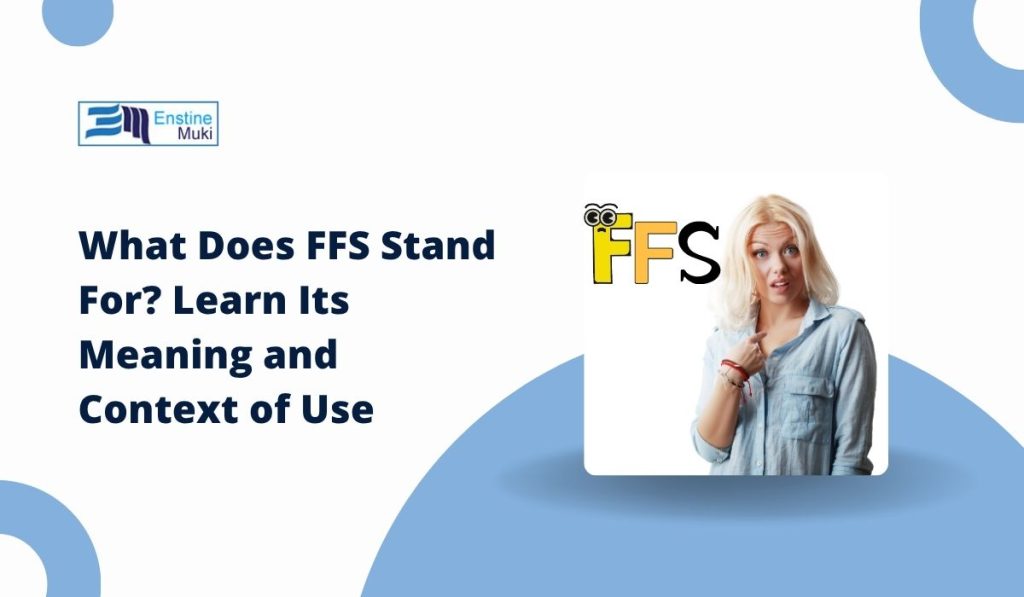You’ve probably seen the term “FFS” online and paused for a second—what does it really mean? It’s short, all caps, and often shows up when someone’s clearly had enough.
FFS is common in social media replies, meme captions, and casual texts. People use it to vent, joke, or react with disbelief. This article will explain exactly what it means, when it works, and when to skip it.
What Does FFS Stand For?
FFS is short for “For F*’s Sake.”** It’s a slang acronym that expresses frustration, disbelief, or annoyance. People say it when something goes wrong, repeats too often, or feels ridiculous. It’s often used when someone is out of patience.
Depending on the tone or setting, it can sound funny, sarcastic, or angry. Saying “FFS” in a message can show how fed up you are—but if you say it with a laughing emoji or in a light way, it can come off more playful than upset.
Where Do People Use “FFS”?
You’ll find “FFS” mostly in casual or personal spaces. It’s rarely used in anything official.
Common places include:
- Text messages between friends
- Reddit comment threads
- TikTok video captions or replies
- Twitter/X reactions
- Discord game chats
- Meme images or GIFs
Is “FFS” Always Rude?
Not always, but it can be. The full phrase includes a swear word, even though the acronym hides it. In many cases, people know what it means anyway. That’s why it can still come across as harsh if you’re not careful.
The meaning changes depending on how it’s said. Among friends, it might be seen as just venting or being dramatic in a funny way. But in other cases, it might seem rude, especially if someone doesn’t know you well.
You should think about who you’re talking to. With close friends or in private chats, it might be fine. But around coworkers, teachers, or people you don’t know well, it’s better to avoid it.
Real Examples: How People Use “FFS” in Conversation
People drop “FFS” into chats and posts in different ways. Here’s how it might look in real life:
- “FFS, not again.”
- “I just cleaned this, FFS.”
- “FFS 😂 why is this so true?”
When You Shouldn’t Use “FFS”
There are many situations where FFS simply doesn’t fit. One of the big ones is at work. Using FFS in a professional email or team message is a quick way to sound unprofessional, even if you’re joking.
Avoid using it in anything formal, like school essays, applications, or public posts tied to your name. It doesn’t matter if the full word isn’t spelled out—people still know what it means.
Even in casual public posts, think twice. If your tone isn’t clear, someone might take it the wrong way. Not everyone will read it as a joke.
Also, using FFS toward someone directly can come across as aggressive or rude, even if you meant it in a light way. It’s best to avoid using it in one-on-one chats unless you’re very sure how the other person will take it.
What to Say Instead: Softer or Funnier Options
If you want to express the same feeling without sounding rude, try a cleaner phrase:
- “Seriously?”
- “Oh come on”
- “Are you kidding me?”
- “Wow, again?”
- “For real?”
Final Thoughts
FFS can be funny or frustrating, depending on how it’s used. It isn’t always mean, but if used in the wrong place, it might come across as harsh. That’s why it matters who you’re talking to and how well they know your style.
Use it casually and only in places where the tone is clear. If you’re chatting with friends who use slang often, it’s usually fine. But in wider groups or posts where tone can be misread, it might be safer to skip it or use a softer phrase.
When in doubt, pause before you send it. A quick second of thinking can save you from sounding upset when you’re really just joking.

